As college students, we all know what it is like to be stressed and filled with anxiety. Whether you’re swamped with three exams in a week, managing to fulfill a position in a club or a professional setting or even having two big papers due for two different classes, there’s just always something going on. I stumbled across the topic of aromatherapy and I was interested in how that might affect a person’s mood and way of life. Studies show that aromatherapy really can do wonders with healing your state of mind and nourish whatever tension your life is bringing you.
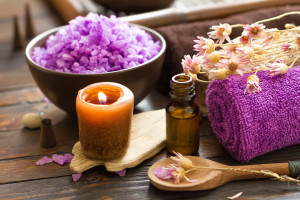 Aromatherapy is “the practice of using the natural oils extracted from flowers, bark, stems, leaves, roots, or other parts of a plant to enhance psychological and physical well being”. I believe that aromatherapy can benefit different aspects of a person’s life because of the positive way that these scents can affect our bodies. Not many people believe in the art of aromatherapy. Each scent triggers a sense of peace in our bodies that help relaxes or ease the pain of a stressful day. Different scents do different things and tends to have different therapeutic properties because of their varying chemical compositions. Some scents are scientifically proven that they can help aid and cure symptoms of illness.
Aromatherapy is “the practice of using the natural oils extracted from flowers, bark, stems, leaves, roots, or other parts of a plant to enhance psychological and physical well being”. I believe that aromatherapy can benefit different aspects of a person’s life because of the positive way that these scents can affect our bodies. Not many people believe in the art of aromatherapy. Each scent triggers a sense of peace in our bodies that help relaxes or ease the pain of a stressful day. Different scents do different things and tends to have different therapeutic properties because of their varying chemical compositions. Some scents are scientifically proven that they can help aid and cure symptoms of illness.
According to University of M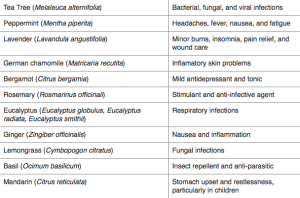 aryland Medical Center, aromatherapy has be proven to have treated conditions such as alopecia areatea (hair loss), agitation (including agitation related to dementia), anxiety, constipation, insomnia, pain, headaches, itching, and psoriasis. The chart on the left that I found shows therapeutic uses for some essential oils.
aryland Medical Center, aromatherapy has be proven to have treated conditions such as alopecia areatea (hair loss), agitation (including agitation related to dementia), anxiety, constipation, insomnia, pain, headaches, itching, and psoriasis. The chart on the left that I found shows therapeutic uses for some essential oils.
There are a couple of articles that I found that show aromatherapy being a cure to anxiety and depression in cancer patients. In this particular article, researchers in Japan (2009) conducted a small trial of 12 patients who have breast cancer found that aromatherapy massage helped reduce their anxiety. In 2007, a UK trial tested whether or not adding aromatherapy massage to the usual treatment for cancer patients would reduce their anxiety and depression related to their chronic illness in people that had advanced cancer. 280 patients participated in the study and they all had anxiety/depression due to their cancers. Half of those patients had the usual treatment (supportive care). The other half had supportive care and the additional aromatherapy massage. The researchers found that the patients who had the additional aromatherapy massage in their supportive care were less anxious and/or depressed for up to 2 to 6 weeks after the massage but showed no difference at 10 weeks. However, further research needed to be conducted and researched to support my hypothesis.
So I searched up an American study (mentioned in this article) that was published in The Journal of Palliative Medicine in 2004 that researched 42 people who had advanced stages of cancer. They were separated into 3 groups. The first group of people were given weekly massages over the span of 4 weeks. The second group was given massages that used only lavender oil for therapy. Group 3 had no massages at all (control group). The result of this experiment was the patients in groups 1 and 2 were sleeping well and showed less depressive symptoms than those patients in group 3, who weren’t getting much sleep and had depression.
I wanted to make sure that the previous study wasn’t just an outlier study so I went and looked ahead at a study that shows how the extract of lavender can reduce a person’s stress (overall). This study involved studying patients in the intensive care unit. They were randomly put into four groups. Correlation coefficients were calculated to look at the relationships between stress response and health measures.
Group 1: were told that they would receive the aromatherapy treatment and received the therapy while doing the task; experimental group
Group 2: told they would receive aromatherapy but they did not; tested the placebo effect
Group 3: not told anything about aromatherapy but still received the treatment; purpose was to test if aromatherapy really works even with the patient being unaware that they are receiving it
Group 4: were not told anything about aromatherapy and did not receive the aromatherapy treatment (control group)
In this study, the results were a little confusing to me because of it disproves the theory that I was suggesting where aromatherapy can cure stress. Each group was given a test to take after given the treatment (if any) they were assigned to. It was mentioned in this study that the effects had no differences between the groups with any of the following characteristics: age, gender, race, level of physical activity, weight, height, physical symptoms, smoking, caffeine, and alcohol consumption, life stressors, and year in school. Group 3 had high levels of stress before taking the test than the rest of the groups. Groups 1, 2, and 4 showed a great increase in stress levels. Only 27.4% of the patients tested on correctly identified the use of lavender essential oil for stress reduction.
However, only the purest, most natural, and highest quality of essential oils can effectively heal one’s illness (so maybe in that last study, the experimenters were using the wrong type of essential oils). Synthetic oils won’t work. Not only can aromatherapy alter a cancer patient’s emotional health, but it can also cure common conditions such as burns, chest congestion, dry skin, earache, eye strain, athlete’s foot, headaches, herpes, weak immune system, nausea, insect bites, joint pain, insomnia, muscle pain, nerve pain, poison ivy, PMS, sore throats, tooth pain, pimples, asthma, and even warts. Now we wonder how this affects different demographics. Are the results different in girls versus boys or does aromatherapy work better for white males rather than hispanic females? Well, because aromatherapy mainly affects our sense of smell and has an antiseptic property that has the ability to eliminate microorganisms that cause disease, it shouldn’t work more for one race than for another, or one gender rather than another. Although, not many studies have been tested to prove this theory.
I, myself, after doing all this research have recently purchased and used essential oils in my life to keep myself more calm during finals week and other stressful weeks that college life seems to throw at you. Personally, I use an oil diffuser that sprays a scented mist throughout my room whenever I study, lounge around, or sleep. I’ve seen improvements in my mood from when I started using my oil diffuser. It helps me concentrate more on my homework and relaxes me before I head to sleep at night.
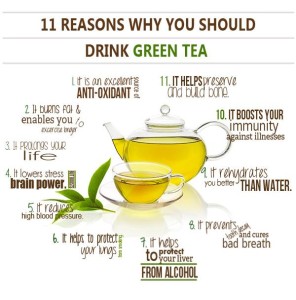
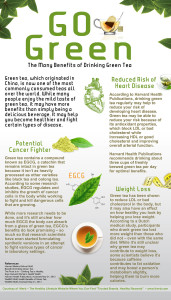

 In
In 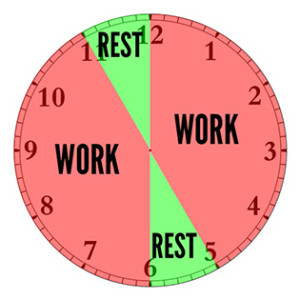
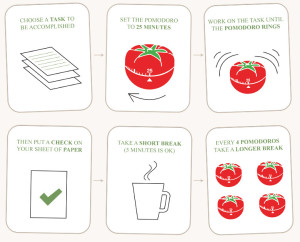 1. Identify the task at hand.
1. Identify the task at hand.
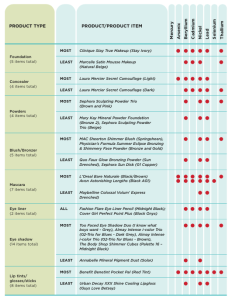

 aryland Medical Center
aryland Medical Center